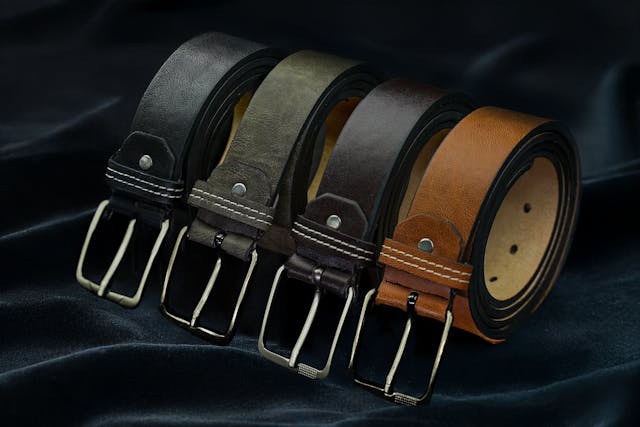Understanding how a belt fits—especially when investing in luxurious leather pieces like those from Reptile’s House—is key to both style and comfort. This guide helps you measure correctly, convert sizes between systems, consider where you’ll wear the belt, and apply tips for exotic leather or custom sizing.
Table of Contents
- Measurement basics: waist vs hips
- Size charts and conversions
- Selecting where to wear your belt
- Special considerations for exotic leathers
- Custom options & Reptile’s House styles
Measurement basics: waist vs hips
Waist vs hips: which to measure?
Belts may sit at your waist (natural waist or above navel) or around your hips or low waist. Reptile’s House recommends measuring at whichever point you intend to wear the belt—that’s where it should fit and feel comfortable.
How to measure accurately
Use a flexible tape measure snugly around the selected site. Breathe normally. Do not add extra inches belts offer adjustment. For example, if you measure 90 cm at your waist, you would choose the belt labelled “90 cm” not much added looseness is required if the belt has multiple holes built in Reptile’s House.
Size charts and conversions
Understanding numerical belt sizes
Reptile’s House typically lists belts by the measurement (e.g. 80 cm, 85 cm, 90 cm, up to 115 cm). Common sizes appear in these increments.
Converting to inches or other sizing systems
To convert: 1 inch = 2.54 cm. Thus, a 90 cm belt equals approximately 35½ inches. If you usually wear a U.S. size 36, it’s safe to choose the 90 cm belt. If you fall between, go with the closest size under or equal.
Allowance and holes:
Most Reptile’s House belts have multiple punched holes, typically offering about 5 cm of adjustment range. If your exact measurement falls between two sizes—for instance 92 cm—choose the larger size (95 cm) to ensure hole allowance rather than a too-tight fit.
Selecting where to wear your belt
Low waist or hips vs natural waist
If your outfit is high-waisted (like tailored trousers) measure at the waistband. For low‑rise jeans or dresses, measure around the hips. Always match the measuring point to where the belt will actually sit on your body.
Different silhouettes require different allowances
Tighter styles need precise sizing; looser looks can afford some slack. Leather stretches slightly over time exotic skins less so. Adjust your choice accordingly.
Checking fit with a belt you own
Measure from the buckle’s tip to the hole you wear most frequently. That distance equals your ideal belt size. Compare it directly to Reptile’s House size chart to match your best fit.
Special considerations for exotic leathers
Exotic skins like python, ostrich, iguana
Belt sizing principles remain the same—but skin properties differ. Exotics like python or ostrich are stiffer and stretch less over time. If in doubt, choose a slightly larger size for comfort, especially if you plan more wear or new leather to break in Amazon.
Width and buckle styles
Some exotic belts come with wide straps or ornate buckles. For example, Reptile’s House designs can have embossed iguana textures or wide seamless 30 mm finishes reptileshouse.it. Measure with a similar-width belt to assess how it layers under clothing or belt loops.
Custom sizing for unique bodies or occasions
If your measurement falls outside standard sizes or you want a specific hole placement, Reptile’s House offers custom-made belts in any size. Reach out with your waist/hip measurement and preferred buckle style.
Read Also: Elegant Accessories: The Rise Of Quiet Luxury & Why Dressing Elegant Matters
Custom options & Reptile’s House styles
Custom sizing explained
They offer to create belts to your exact measurement not just standard increments. It helps if you indicate your desired hole centered in the set so that the middle hole corresponds to your measured circumference.
Classic styles and standard size range
Popular collections such as “Oakland” or “Bild” belts come in sizes 80 cm through 115 cm in 5 cm increments.
Final adjustments and practical tips
• If the belt feels too snug on the tightest hole, one size up is safer.
• If it’s loose even on the outermost hole, one size down ensures a better fit.
• Remember leather may soften or stretch slightly over time especially calf leather—and holes may loosen.
Why accurate sizing matters for luxury leather belts
A belt that fits well enhances both silhouette and comfort; a loose or too-tight belt detracts from elegance. Exotic leathers in particular represent a higher investment and limited stretch incorrect sizing can’t be easily remedied with holes or putting pressure.
Reptile’s House craftsmanship is Italian-made, using high‑quality calf and exotic skins. Their sizing system is thoughtfully designed to match your exact wear point, and custom services make the process even more accurate. This ensures whether you’re choosing a classic calf-leather strap or a python‑inlay designer model, the belt looks balanced and feels effortless.
Summary & fit checklist
Step‑by‑step checklist:
- Decide where you’ll wear the belt: waist or hips
- Measure that circumference carefully
- Compare with Reptile’s House numeric belt sizes
- Allow for adjustment via provided holes (typically ±2.5 cm)
- If between sizes, choose the next larger unless skin will relax
- Consider custom order if size falls outside standard range or you require specific hole placement
- Assess width and buckle style—wider straps may require more clearance
By following these steps, you ensure purchasing a beautifully crafted leather belt that fits elegantly and works for years.




